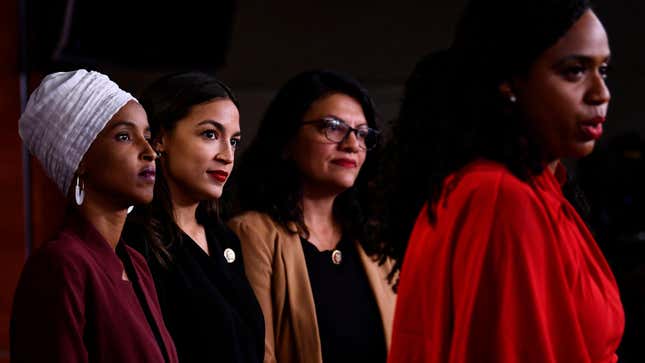The Squad's Moving, Powerful Speeches Represent a Turning Point on Palestine and Israel
NewsPolitics

On Thursday night, the members of the Squad spoke movingly about the rights of Palestinians and the toll that violence takes on all people, in speeches that sharply criticized the U.S.’s role in funding and supporting the Israeli government’s program of apartheid, forced expulsions, and asymmetrical violence. In what the Intercept called a “historic moment on the House floor,” Rashida Tlaib, Ayanna Pressley, Cori Bush, Ilhan Omar, and Alexandria Ocasio-Cortez gave talks that, taken together, signal a broader shift when it comes to Americans’ willingness to criticize the policy decisions of both the U.S. and Israeli governments. What was once an untouchable third rail in U.S. politics, even for many so-called progressives, is no longer unspeakable.
Tlaib, the child of Palestinian immigrants whose grandmother continues to live in the occupied Palestinian territory of the West Bank, began by noting that her “mere existence has disrupted the status quo.” Tlaib continued, directing her message to her House colleagues: “Palestinians aren’t going anywhere, no matter how much money you send to Israel’s apartheid government. If we are to make good on our promises to support equal human rights for all, it is our duty to end the apartheid system that for decades has subjected Palestinians to inhumane treatment and racism.”
She noted that prominent human rights organizations, including Human Rights Watch, are belatedly beginning to recognize Israel as an apartheid state, and she criticized the weak response of President Joe Biden and Secretary of State Anthony Blinken. Reading their statements, she said, “You’d hardly know Palestinians existed at all.” Tlaib added, “Above all, there has been absolutely no recognition of Palestinian humanity.”
“I weep for all of the lives lost under the unbearable status quo, every single one, no matter their faith, their background,” Tlaib continued, her voice breaking. “No child, Palestinian or Israeli, whoever they are, should ever have to worry that death will rain from the sky. How many of my colleagues are willing to say the same, to stand for Palestinian human rights as they do for Israeli?” She added, “How many Palestinians have to die for their lives to matter?”
-

-

-

-

-

-

-

-

-

-

-

-

-

-

-

-

-

-

-

-

-

-

-

-

-

-

-

-

-

-

-

-

-

-

-

-

-

-

-

-








































